

The Backbencher – ‘Englishness': Purely A Sports Concept? For me, the Union Jack is a source of pride, representative of all our small island has achieved.
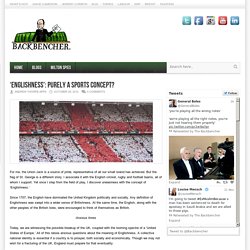
But the flag of St. George is a different story. I associate it with the English cricket, rugby and football teams, all of whom I support. Yet once I step from the field of play, I discover uneasiness with the concept of ‘Englishness.’ Since 1707, the English have dominated the United Kingdom politically and socially. British Futures Englishness Poll. British Future. As part of the Festival of Englishness co-hosted with IPPR, British Future commissioned ICM to conduct polling about English identity to decipher how people feel about the England flag and other hallmarks of English identity.
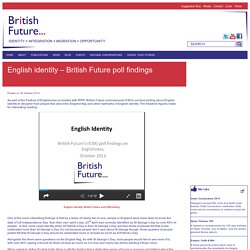
The headline figures make for interesting reading: One of the more interesting findings is that by a factor of nearly two to one, people in England were more likely to know the date of US Independence Day than their own saint’s day: 23rd April was correctly identified as St George’s day by only 40% of people. In fact, more could identify when St Patrick’s Day is than St George’s Day and two-thirds of people felt that it was celebrated more than St George’s Day. It’s not because people don’t care about St George though: three-quarters of people polled felt that St George’s Day should be celebrated more or at least as much as St Patrick’s Day.
Alongside this there were questions on the English flag. British Future. St Patrick’s Day has firmly established itself on the annual calendar in England, with the help of a certain brand of stout, but England’s own patron saint’s day, St George’s Day, is a much more sedate affair.
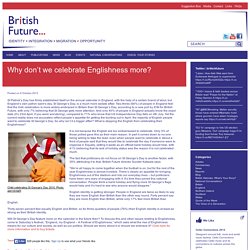
Two-thirds (66%) of people in England feel that the Irish celebration is more widely-embraced in Britain than St George’s Day, according to a new poll by ICM for British Future, with only 7% believing that St George gets more attention. And only 40% of people in England actually know the exact date (it’s 23rd April, if you were wondering), compared to 71% who know that US Independence Day falls on 4th July. Yet the current reality does not accurately reflect people’s appetite for getting the bunting out in April; the majority of English people want to celebrate St George’s Day. English and British identity: poll on St George's Day date. Only four out of ten people in England knew that St George's Day was on 23 April, but 71% could name the date of US Independence, a poll conducted across the UK and out on Friday found.
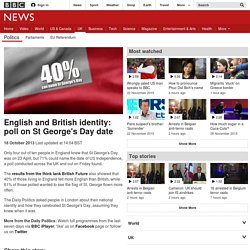
The results from the think tank British Future also showed that 40% of those living in England felt more English than British, while 61% of those polled wanted to see the flag of St. George flown more often. The Daily Politics asked people in London about their national identity and how they celebrated St George's Day, assuming they knew when it was. Juncture interview: Linda Colley on Englishness. Speaking to Juncture's Guy Lodge, historian Linda Colley rejects the idea that British disintegration is inevitable but says a new constitutional settlement is needed to bind the nations and people of the United Kingdom together, and to help clarify its relationship with Europe.
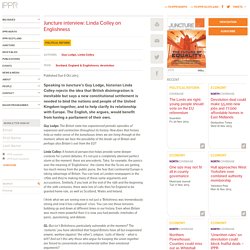
The English, she argues, would benefit from having a parliament of their own. Guy Lodge: The British state has experienced periodic episodes of expansion and contraction throughout its history. How does that history help us make sense of the tumultuous times we are living through at the moment, where we face the possibility of the break-up of Britain and perhaps also Britain's exit from the EU?
Linda Colley: A historical perspective helps provide some deeper contexts for current debates. It's not just a completely aberrant perfect storm at the moment: there are precedents. English nationalism is out of the bottle, whoever wins. Spare a moment for the union, buried by its own defenders.

The Conservatives have opted to fan English nationalism and resentment, both to peel off voters in key English marginals and to delegitimise any future Labour government backed by the SNP. Such nationalist resentment cannot be stoked and then neatly placed back into a box when it has outlived its use, discarded until deemed useful when another political crisis arises. English nationalism is set to become a mighty force over the next five years, whoever governs, and it may well help to consume an already disintegrating union. The union was always a curious construction, as any supporter of Scottish independence will tell you: imposed by elites, and then cemented after the event. When the campaign of fear during the referendum appeared to be failing or even backfiring, the Tories resorted to begging Scotland to remain.
England, my England: A festival of Englishness. Englishness is on the rise, in many ways.
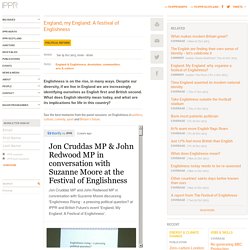
Despite our diversity, if we live in England we are increasingly identifying ourselves as English first and British second. What does English identity mean today, and what are its implications for life in this country? See the best moments from the panel sessions: on Englishness in politics, culture, comedy, sport and Britain's future. Population Estimates for UK, England and Wales, Scotland and Northern Ireland, Mid-2011 and Mid-2012. English independence. England (red) within the United Kingdom (pink) along with Republic of Ireland and Isle of Man English independence is a political stance advocating secession of England, the largest and most populous country of the British Isles, from the United Kingdom.
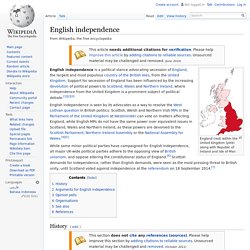
Support for secession of England has been influenced by the increasing devolution of political powers to Scotland, Wales and Northern Ireland, where independence from the United Kingdom is a prominent subject of political debate.[1][2][3] English independence is seen by its advocates as a way to resolve the West Lothian question in British politics: Scottish, Welsh and Northern Irish MPs in the Parliament of the United Kingdom at Westminster can vote on matters affecting England, while English MPs do not have the same power over equivalent issues in Scotland, Wales and Northern Ireland, as these powers are devolved to the Scottish Parliament, Northern Ireland Assembly or the National Assembly for Wales.[4][5] History[edit] Englishness is a cultural identity. Paul Kingsnorth responds to Mark Perryman's call in Breaking up Britain for a progressive English identity.
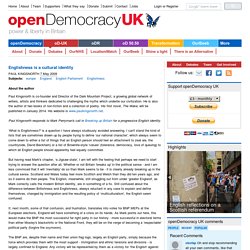
‘What is Englishness? ' is a question I have always studiously avoided answering. I can't stand the kind of lists that are sometimes drawn up by people trying to define ‘our national character', which always seem to come down to either a list of things that an English person should feel an attachment to (real ale, the countryside, David Beckham) or a list of Brownite-style ‘values' (tolerance, democracy, love of queuing) to which all English people should apparently feel equally committed. But having read Mark's chapter, ‘a Jigsaw state', I am left with the feeling that perhaps we need to start trying to answer the question after all. What is Britishness? This lesson looks at Britishness and what the term means to different people.
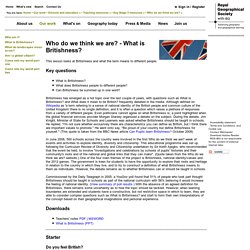
Key questions What is Britishness? What does Britishness people to different people? What defines Britishness? The monarchy, the BBC and pubs. Penny Young of NatCen Social Research, which carried out the survey, attributed the drop to factors including the fallout from the war in Iraq and the faltering economy. "There was a lot of confidence in Britain in 2003 but now we are still recovering from the financial crash," she said. "For some people, greater exposure to other countries through budget travel and a wider digital community can lead them to query what it means to be British. " Proud or not, almost three quarters of people (74 per cent) see Britain as being defined by the monarchy. While 73 per cent see William Shakespeare as the most important figure when it comes to defining Britishness, 73 per cent also chose the common law and the House of Commons.
Some 70 per cent thought the BBC was key to defining the country, while 69 per cent said pubs and 67 per cent chose our weather. Let's not make a fuss: 10 things that sum up Britishness. It's an interesting time to be British. With Scotland a hundred days away from a vote on independence, the term could be due a radical overhaul. So we thought it would be worth finding out what our readers thought of Britishness, regardless which corner of the United Kingdom they called home. Definitions and origins of the words England - English - Englishness. The origins of the words ‘England’ and ‘The English’ The words ‘English’ and ‘England’ come from the Anglo-Saxon. The Anglo-Saxons were not a single people, and may not have been even a formal confederation originally. Primarily made up of Jutes from Jutland where they are still called Jutes in that area, the Engle or Angles from Angeln in Denmark, also called the ‘Anglii’ (Latin for Engle,) by the Roman historian Tacitus, and the Seax, named after their formidable fighting knife of the same name, who came from Saxony Elbe-Weser region in Germany.
Smaller number of Frisians came from the small islands in the North Sea.There were also Jutes from the lower Rhineland, and Swabians, Franks and Alamanni. Shane Meadows This is England. 3for independence from the social conventions and habits of their milieu. More than aphilosophy and a strong feeling of identity, the gang depends on the appropriate dresscode which makes them equal to one another and, at the same time, different from therest of the gangs.Bearing in mind the eighties, British youth culture was heavily marked by theemphasis given to naming the trends and the ‘ethnicities’ Kumar%20(Englishness%20and%20English%20national%20identity) Jack Wilshere row: How do we define Englishness? England footballer Jack Wilshere has caused a stir by saying only "English people" should play for England. It follows the news that Manchester United teenager Adnan Januzaj could represent England despite being born and raised in Belgium. But what makes someone culturally English and could Januzaj ever qualify?
Penalty shootout failures. What does 'Englishness' mean to you? A (very) rough guide to America from an Englishman in New York.